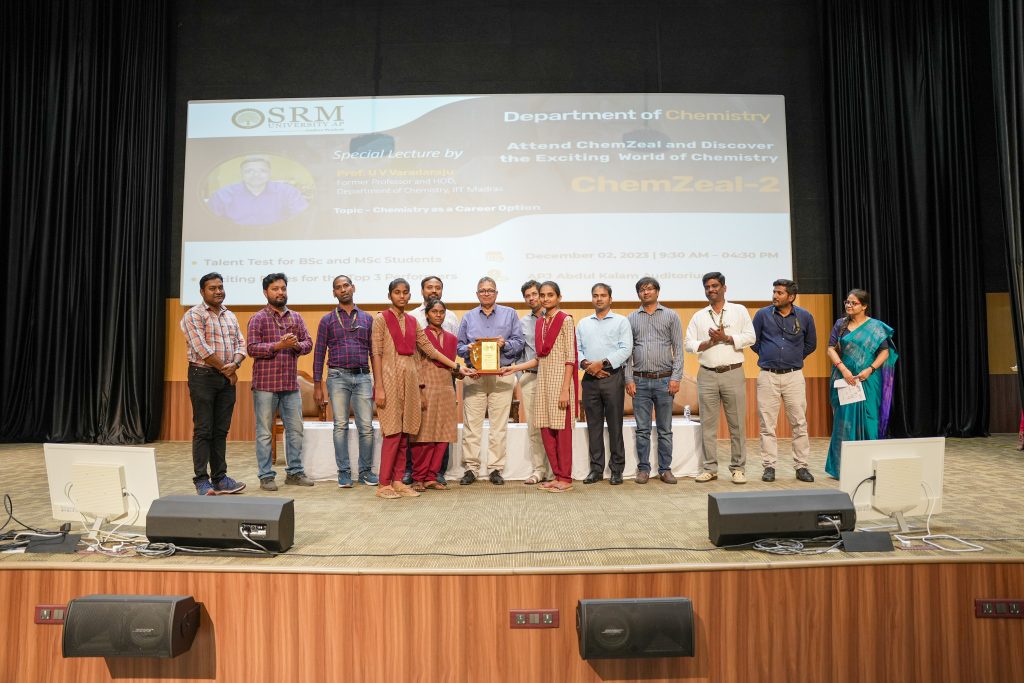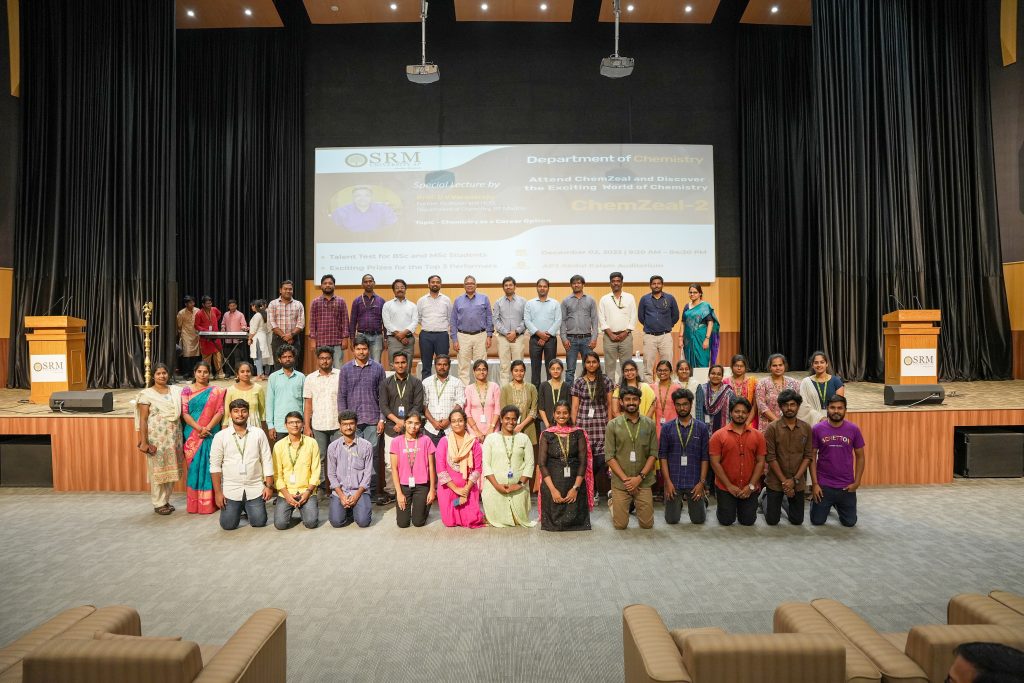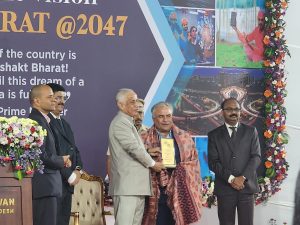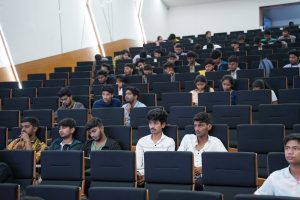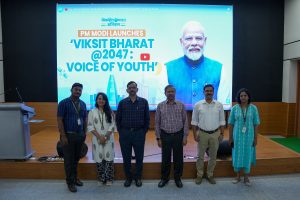ChemZeal 2: An Outreach Initiative by the Dept. of Chemistry
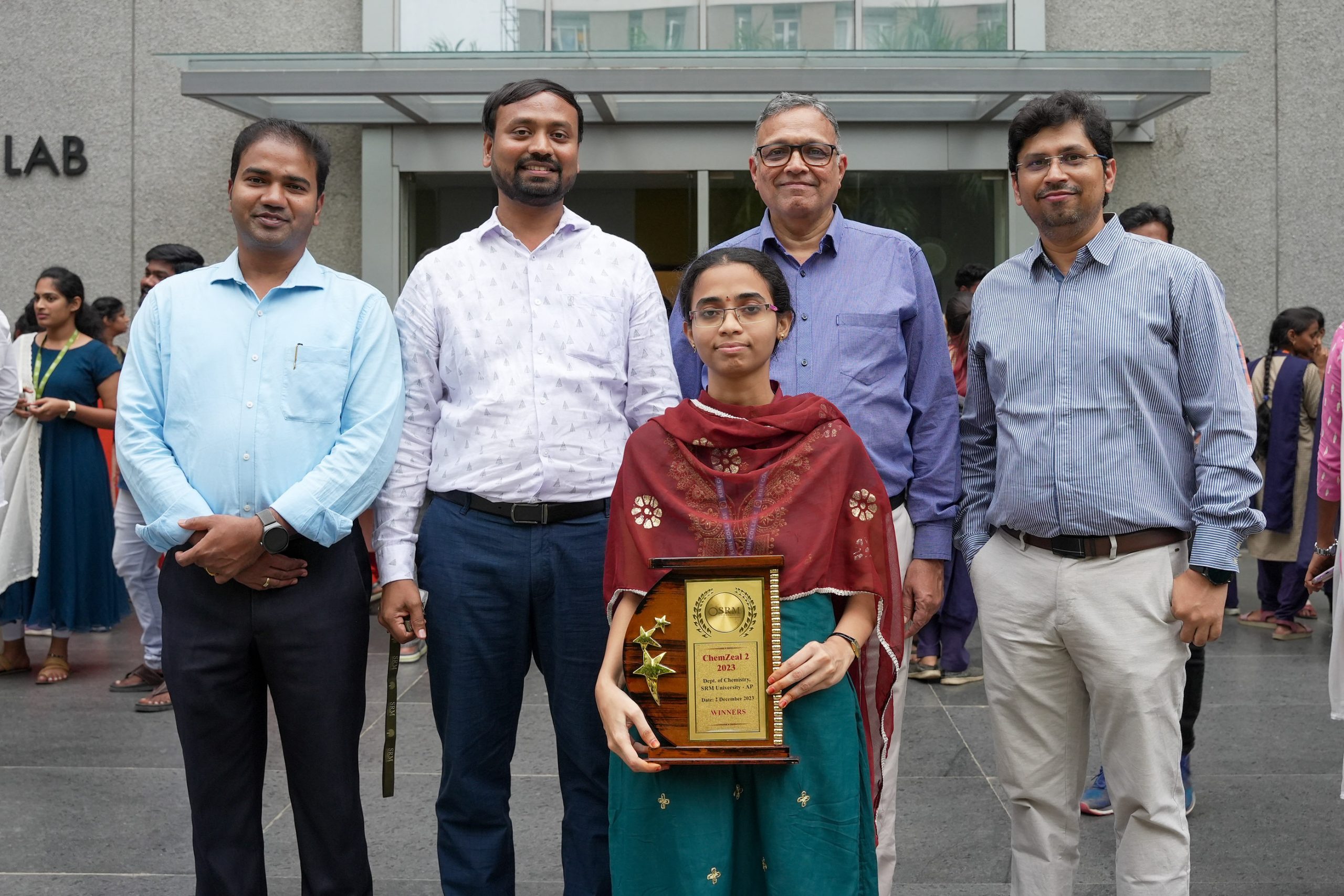
The Department of Chemistry at SRM University-AP organised an academic colloquium called ChemZeal 2 on December 02, 2023. The event aimed to promote the Department and its research among undergraduate and graduate students from various colleges. It also provided a platform for students to interact with chemistry enthusiasts and learn about the latest advancements and research in the field.
ChemZeal 2 featured a lecture by academic stalwart, Prof. U V Varadaraju on Solid-State Materials in Chemistry from the Department of Chemistry, IIT Madras. Prof. Varadaraju also spoke about various aspects of the field, including research, career paths, higher studies, and job opportunities in the industry.
The welcome note was given by the Department Head, Dr Pardha Saradhi Maram, while Vice-Chancellor Prof. Manoj K Arora and Prof. Jayaseelan Murugaiyan, Associate Dean in-charge (Science), also addressed the gathering with their valuable inputs. The event also included an interactive session with the guest speaker, where faculty and students could interact and get expert insights.
ChemZeal 2 also featured a talent test for over 320+ students from different colleges, with prizes awarded to the top three winners. The event was designed to attract students to pursue higher education and research in the field of Chemistry and provided a platform for BSc/MSc/PhD students to showcase their research and interact with potential candidates.
The event organisers – Dr Sabyasachi Chakrabortty (Convenor) & Dr J P Raja Pandiyan (Co-convenor) helped culminate the outreach activity with a campus tour, where attendees could witness state-of-the-art facilities, high-end research labs, and futuristic technology.
- Published in Chemistry-news, Departmental News, News
Viksit Bharat@2047: Empowering India’s Youth
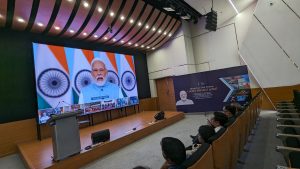 In a remarkable display of technological prowess and inclusivity, SRM University-AP organised a live-streaming event for the launch of ‘Viksit Bharat @2047: Voice of Youth’ by Prime Minister Shri Narendra Modi. The momentous occasion took place at the university’s auditorium, witnessing the presence of esteemed dignitaries, including the Registrar, Dr R Premkumar, Director of Student Affairs, Mr Anil Kumar Nigam, Director of Communications, Mr Pankaj Belwariar, Associate Director of Student Affairs, Ms Revathi Balakrishnan, and a multitude of enthusiastic students.The event, which aimed to empower the youth and encourage their active participation in shaping the future of India, was broadcasted live to ensure widespread accessibility. The atmosphere in the auditorium was electric as the audience eagerly awaited the Prime Minister’s address.
In a remarkable display of technological prowess and inclusivity, SRM University-AP organised a live-streaming event for the launch of ‘Viksit Bharat @2047: Voice of Youth’ by Prime Minister Shri Narendra Modi. The momentous occasion took place at the university’s auditorium, witnessing the presence of esteemed dignitaries, including the Registrar, Dr R Premkumar, Director of Student Affairs, Mr Anil Kumar Nigam, Director of Communications, Mr Pankaj Belwariar, Associate Director of Student Affairs, Ms Revathi Balakrishnan, and a multitude of enthusiastic students.The event, which aimed to empower the youth and encourage their active participation in shaping the future of India, was broadcasted live to ensure widespread accessibility. The atmosphere in the auditorium was electric as the audience eagerly awaited the Prime Minister’s address.
Parallel to the main event, a program was held at Raj Bhavan in Vijayawada, where Vice Chancellor, Prof. Manoj K Arora along with other prominent personalities, graced the occasion. Prof. Manoj K Arora actively participated in a panel discussion centered around the theme of ‘Viksit Bharat @2047: Voice of Youth,’ sharing valuable insights and ideas for the nation’s progress. The Vice Chancellor’s dynamic contribution to the panel discussion was recognised and appreciated by the Governor of Andhra Pradesh, who honoured him with a shawl and a memento as a token of gratitude.
The live streaming event organised by SRMAP not only showcased their commitment to embracing technology for the benefit of the students and the wider community but also provided a platform for young minds to engage with the Prime Minister’s vision for a developed and empowered India. The launch of ‘Viksit Bharat@2047: Voice of Youth’ marks a significant milestone in the journey towards a progressive and inclusive nation, with SRM University-AP playing a pivotal role in fostering the spirit of youth leadership and participation.
- Published in News
SLP-E: Enhancing Privacy and Lifespan in WSNs for IoT
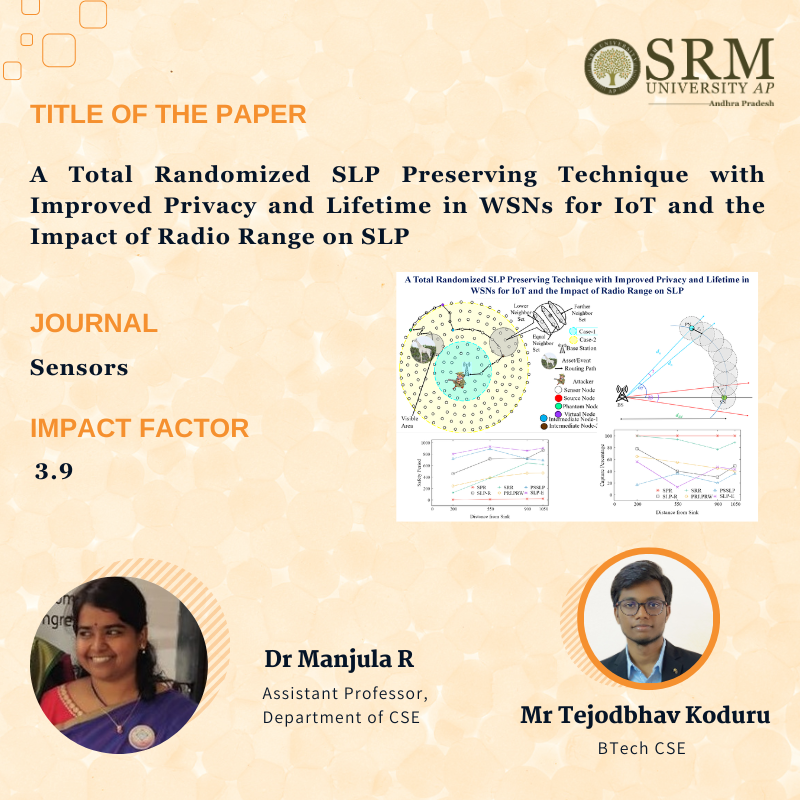
The Department of Computer Science and Engineering is thrilled to share that the paper titled, “A Total Randomized SLP Preserving Technique with Improved Privacy and Lifetime in WSNs for IoT and the Impact of Radio Range on SLP” has been published by Dr Manjula R, Assistant Professor, Department of CSE, and BTech-CSE Student Mr Tejodbhav Koduru in “Sensors“, a Q2 journal, having an Impact Factor of 3.9. Their research addresses the critical need for improved source location privacy and extended network longevity, presenting a pioneering solution known as Source Location Privacy with Enhanced Privacy and Network Lifetime (SLP-E).
Abstract
SLP-E utilises a unique combination of techniques, including a reverse random walk, a walk on annular rings, and min-hop routing, to diversify routing pathways within the network. Unlike existing SLP techniques that either prioritize privacy over network lifetime or vice versa, this approach aims to simultaneously enhance safety period, network lifetime, and privacy uniformly. Notably, this research also explores the impact of sensor radio range on Network Lifetime metrics and privacy strength within the context of SLP in WSN.
Practical Implementation/Social Implications of the research
This research holds real-world significance, especially in scenarios like protecting a lone white giraffe in Kenya fitted with a GPS tracker. Poachers pose a serious threat to such animals, hacking GPS devices to locate and harm them. This solution offers a viable approach to mitigate these threats, providing practical implications for the conservation of endangered species.
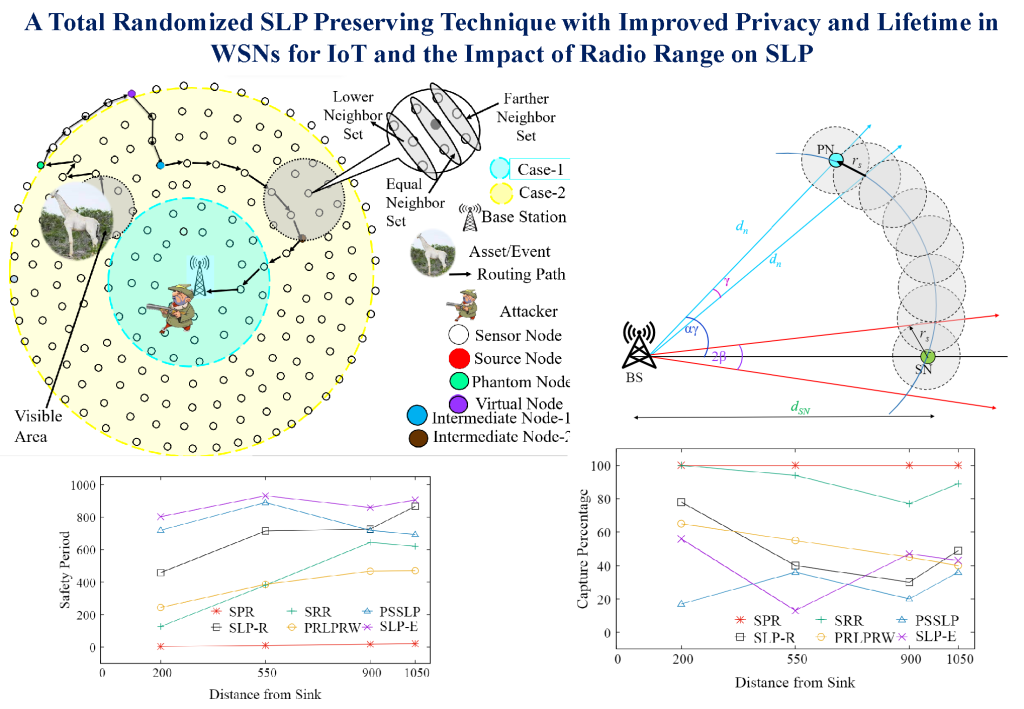
Collaborations
- Mr Tejodbhav Koduru from SRM University-AP
- Prof. Raja Datta from IIT Kharagpur
- Ms Florence Mukamanzi, Dr Damien Hanyurwimfura and Prof. Mukanyiligira Didacienne from the African Center of Excellence in the Internet of Things, University of Rwanda
- Published in CSE NEWS, Departmental News, News, Research News
Paper Presented at the NIAS Conference in Amsterdam
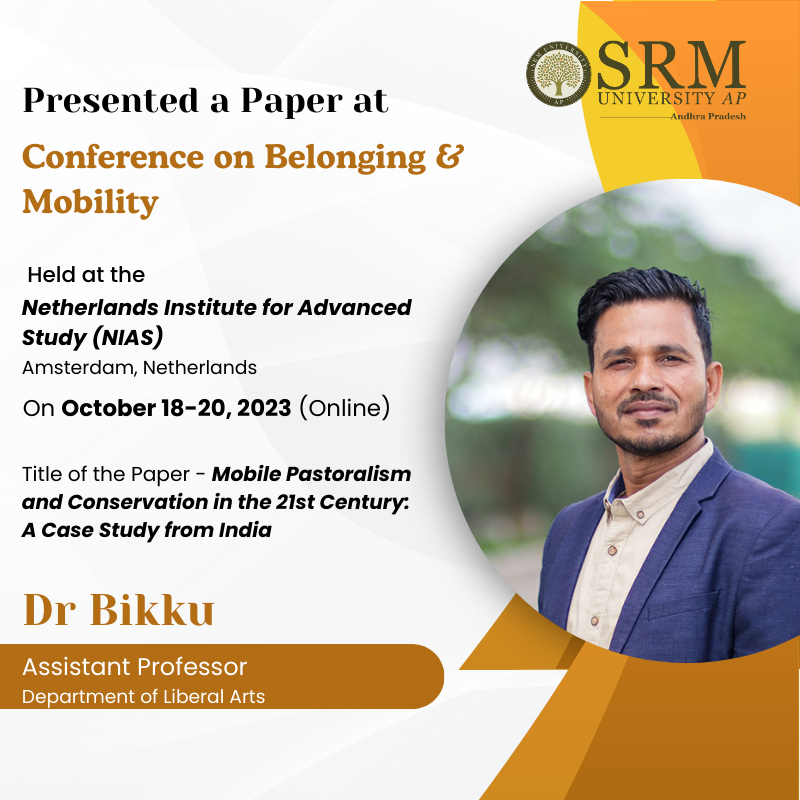
Dr Bikku, Assistant Professor, Department of Liberal Arts has presented a paper titled “Mobile Pastoralism and Conservation in the 21st Century: A Case Study from India” at the NIAS Conference on Belonging & Mobility, held at the Netherlands Institute for Advanced Study (NIAS), Amsterdam, Netherlands on October 18-20, 2023 (online).
Congratulations to Dr Bikku for this remarkable achievement. SRM AP immense pride in the success of its faculty and scholars and applauds their unwavering commitment to scientific excellence and societal impact!
Abstract
The study focuses on the struggle of nomadic pastoralists to continue their traditional occupation of raising livestock at different landscapes in the face of the shifting political ecology in India. Pastoralism is a traditional subsistence livelihood pattern that involves raising domestic animals in different pastures. For pastoralists to use continually shifting resources in a variety of ecological landscapes, mobility is an effective strategy. However, the current conservation approach has colonial roots and reinforces biodiversity conservation by establishing and enforcing protected areas in several countries around the globe. Scientific conservationists and states have often seen pastoralism responsible for environmental degradation and wildlife decline through over-grazing and resource competition, respectively. As a result, the customary rights of the various pastoralist groups have been denied inside and outside the protected areas.
The paper investigates the current global conflicts between pastoralism and conservation. It also emphasises the changing dimensions of mobile pastoralism and conservation policies in India. By challenging the conservationists’ and the state’s preconceived notions about pastoralism, the Raika mobile pastoralists of Rajasthan, India, provide sustainable pastoralism and nature conservation through evidence of the coexistence of pastoralism and multispecies.
- Published in Departmental News, Liberal Arts News, News, Research News


